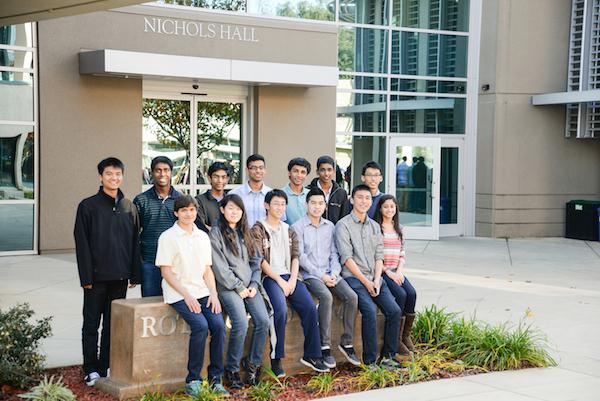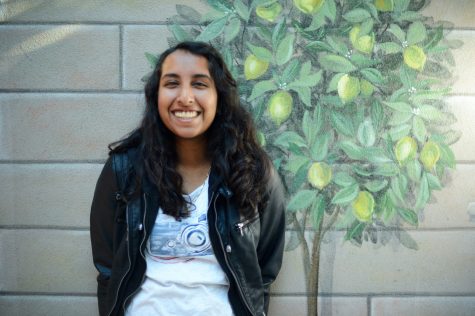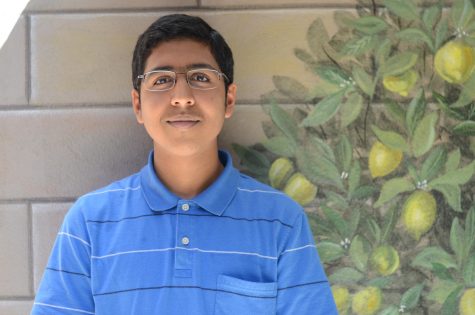Q&A with some of the Semifinalists

Kyle Cavallaro
(BACK ROW) Seniors Steven Wang, Nikash Shankar, Neil Movva, Shikhar Dixit, Pranav Reddy, Sriram Somasunduram, Andrew Jin. (FRONT ROW) Seniors Kailas Vodrahalli, Cindy Liu, Andrew Zhang, Leo Yu, David Lin, and Anokhi Saklecha. 15 seniors were named Intel STS semifinalists on Jan. 7, the most in school history. Not pictured: Rohith Kuditipudi and Rachel Wu.
Three Harker seniors were selected as finalists in the annual 2015 Intel Science Talent Search on Jan. 21, and fifteen seniors were named semifinalists on Jan. 7. This year, Harker not only has the largest number of finalists and semifinalists in Harker history, but also more than any other high school in the country.
The following students were named semifinalists: Shikhar Dixit, Andrew Jin, Rohith Kuditipudi, David Lin, Rachel Wu, Cindy Liu, Neil Movva, Pranav Reddy, Anokhi Saklecha, Nikash Shankar, Sriram Somasundaram, Kailas Vodrahalli, Steven Wang, Leo Yu, and Andrew Zhang. Andrew Jin, Steven Wang, and Rohith Kuditipudi went on to become Intel finalists.
“Our seniors have paved the way for our younger student researchers by not only setting a standard but also proving and passion and hard work does create possibility,” science department chair Anita Chetty said. “To know that a smaller school such as ours can fare better than larger, magnet schools that draw from larger populations is an important achievement.”
The Intel Science Talent Search (STS) is a program of the Society for Science and the Public, an organization for public interest in scientific research and education. STS originated in 1942 and is currently one of the most highly regarded competition for high-school seniors. Since 1998, it was sponsored by Intel and continues to grow as a competition.
“You must find a question that you are so curious in answering that you will spend hours and hours searching for answers. You must craft your own research question and find what it is that you are interested in,” Chetty said. “Do not look for someone else to tell you what your project ought to be and do not try to find a project that represents a ‘hot topic’. Find something and then take it as far as you can.”
This year, Intel has tripled the top award money and added new categories. Each student receives $1000 for becoming a semifinalist, and $1000 from Intel goes to the school. 40 students are selected as finalists for STS out of the 300 semifinalists. Nine of those 40 students are from Bay Area high schools.
Several of the seniors conducted their research through summer research internships at colleges such as Stanford and NYU. Many were also aided in their research by Harker staff, who provided them with certain guidelines while writing papers and kept them on track with due dates for the projects.
“Mr. Pistacchi was really helpful,” Rachel said. “When he looked over my paper, he pointed out a few big picture things that people in my lab didn’t really realize because they were so familiar with my project, so it was good to have an outside perspective.”
Harker’s Science Department continues to encourage students to pursue the sciences, especially with the increased success of students in recent years.
“Our whole student body is talented. If you can finish a Harker class, you can do science research,” Rohith said. “If you can get excited about it, you can do it well. And it’s really just as simple as that.”
WP: How many hours did you put into your projects?
AJ: I did mine in a summer program, so that was probably 10 hours every day over the summer and I still did a lot at home after the program ended.
RK: I was working remotely because it was a computational project, so I would just get on weekly or biweekly conference calls for checkups. That was part of a larger project. For the Intel project, I really put the most work into it starting at the beginning of October. A lot of people spend almost a year working on their projects and start writing the papers a couple months before, but that’s definitely not me. I’m more of a procrastinator, and I think a lot of my teachers can attest to that.
SW: I basically worked throughout the entire summer and into the year, so I went into the lab maybe eight hours a day, and maybe on the weekends or after the lab time I worked on some computational computer analysis as well on my project, so that took up the whole summer. During the school year, I started the paper-writing process.
WP: What impact do you hope your work will have?
SW: I hope my work will have impact in two main areas. First, just having new leads into how we understand how cancer forms and evolves. Another is that a lot of the times most of the big research is just going into fields like drug discovery or personalized medicine, which are incredibly interesting topics, but what my topic exposed me to is how we always have to be questioning current methods, so we have to question how cell culture methods are being done and what we can do to improve on them. I hope that my project will also address these challenges and hopefully revolutionize just how we conduct standard protocols, not just big medical discoveries.
AJ: I researched evolution, so a lot of it will be valuable across many different disciplines like anthropology and developmental biology. Specifically I looked at mutations in natural selections, so a lot of that is really important to how humans evolved over the last thousands of years to adapt to selective pressures such as disease.
RK: I looked at a disease that progresses in stages with the final stage being a type of cancer, so hopefully my work will help people understand why some people with the disease are more likely to progress to cancer than other people.
WP: How do you feel science competitions impact how students approach research?
RK: I think at Harker in particular there is a sort of celebrity associated with these competitions and they put a huge emphasis on it. I think it’s great because it does get a lot of kids excited about science and that’s one of the benefits of these competitions and that’s tremendous, but I think at the same time you have to keep perspective and realize that it’s not the end of the world. There are other ways where you can demonstrate your passion for science research than by just winning these select few competitions.
SW: The way I see it is that it has both pros and cons. If I weren’t involved in any of these competitions I probably wouldn’t have written any sort of technical papers, but I still would’ve done the research. So it kind of goes both ways in that the competitions aren’t necessary to really get deep into the research process, but they do help in terms of teaching you what to expect out of a presentation or how do professional writers actually write a paper. The best way to describe it is that if you have a person who won a competition and had a super deep passion into research, if you take that competition away, it’s still that same person that really loves doing research but he might have learned a lot of things in the way of the competition.
AJ: I’ve seen some people who I’ve worked in labs with. I’ve seen some Harker kids [whose] parents before they start the internship like, “We need a good project that can be submitted to Intel or Siemens that has a great application,” and I don’t think that’s the way to go about doing it. I feel like you just truly find something you’re passionate about, and just work at it throughout the summer, work at it for the purpose of discovering something new and just getting the skills to be a great researcher at the end. You’ll have all the stuff you did and won’t be thinking of the competition at all and spend like a month or so working on a technical paper that you can submit.
RK: As much as you can strive for these competitions, another trap that a lot of people fall into is limiting themselves by focusing on these competitions. So if your mentor says that I have a really cool idea that might take 6 months to a year, the worst thing you could possibly do is try to take shortcuts just to get a product out in a shorter amount of time. If you just enjoy the process then good things will happen.

Kshithija “KJ” Mulam (12) is the Winged Post Editor-in-Chief. Serving as the Winged Post News Editor in her junior year, Winged Post Photo Editor in...

Vijay Bharadwaj (11) is one of the opinion editors for The Winged Post and Aquila. She served as the assistant opinion editor and the Wingspan copy editor...


















![“[Building nerf blasters] became this outlet of creativity for me that hasn't been matched by anything else. The process [of] making a build complete to your desire is such a painstakingly difficult process, but I've had to learn from [the skills needed from] soldering to proper painting. There's so many different options for everything, if you think about it, it exists. The best part is [that] if it doesn't exist, you can build it yourself," Ishaan Parate said.](https://harkeraquila.com/wp-content/uploads/2022/08/DSC_8149-900x604.jpg)




![“When I came into high school, I was ready to be a follower. But DECA was a game changer for me. It helped me overcome my fear of public speaking, and it's played such a major role in who I've become today. To be able to successfully lead a chapter of 150 students, an officer team and be one of the upperclassmen I once really admired is something I'm [really] proud of,” Anvitha Tummala ('21) said.](https://harkeraquila.com/wp-content/uploads/2021/07/Screen-Shot-2021-07-25-at-9.50.05-AM-900x594.png)







![“I think getting up in the morning and having a sense of purpose [is exciting]. I think without a certain amount of drive, life is kind of obsolete and mundane, and I think having that every single day is what makes each day unique and kind of makes life exciting,” Neymika Jain (12) said.](https://harkeraquila.com/wp-content/uploads/2017/06/Screen-Shot-2017-06-03-at-4.54.16-PM.png)








![“My slogan is ‘slow feet, don’t eat, and I’m hungry.’ You need to run fast to get where you are–you aren't going to get those championships if you aren't fast,” Angel Cervantes (12) said. “I want to do well in school on my tests and in track and win championships for my team. I live by that, [and] I can do that anywhere: in the classroom or on the field.”](https://harkeraquila.com/wp-content/uploads/2018/06/DSC5146-900x601.jpg)
![“[Volleyball has] taught me how to fall correctly, and another thing it taught is that you don’t have to be the best at something to be good at it. If you just hit the ball in a smart way, then it still scores points and you’re good at it. You could be a background player and still make a much bigger impact on the team than you would think,” Anya Gert (’20) said.](https://harkeraquila.com/wp-content/uploads/2020/06/AnnaGert_JinTuan_HoHPhotoEdited-600x900.jpeg)

![“I'm not nearly there yet, but [my confidence has] definitely been getting better since I was pretty shy and timid coming into Harker my freshman year. I know that there's a lot of people that are really confident in what they do, and I really admire them. Everyone's so driven and that has really pushed me to kind of try to find my own place in high school and be more confident,” Alyssa Huang (’20) said.](https://harkeraquila.com/wp-content/uploads/2020/06/AlyssaHuang_EmilyChen_HoHPhoto-900x749.jpeg)


